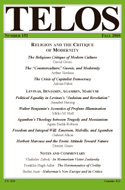As an occasional feature on TELOSscope, we highlight a past Telos article whose critical insights continue to illuminate our thinking and challenge our assumptions. Today, Katherine McGinity looks at Dimitri Ginev’s “The Erotic Attitude Toward Nature and Cognitive Existentialism” from Telos 152 (Fall 2010).
 Dimitri Ginev’s “The Erotic Attitude Toward Nature and Cognitive Existentialism” seeks to uncover ways in which Herbert Marcuse’s call for a “new science” could be achieved in current scientific research. Marcuse’s ideas are committed to an “erotic” attitude toward nature that moves away from the technological rationality that drives scientific research. Marcuse posits that engaging in an erotic attitude toward nature would allow natural entities to “be what they are” and reveal their inherent aesthetic qualities. According to Marcuse, this dramatic shift in scientific research would change essentialist thinking about science and its norms of objectivity. Ginev shares Marcuse’s feeling that current scientific research methods are problematic in their reductive approach to nature as something that can be controlled and manipulated. However, Ginev points out that attempting to dismantle the subjective-objective structure of modern science proves difficult based solely in Marcuse’s outline:
Dimitri Ginev’s “The Erotic Attitude Toward Nature and Cognitive Existentialism” seeks to uncover ways in which Herbert Marcuse’s call for a “new science” could be achieved in current scientific research. Marcuse’s ideas are committed to an “erotic” attitude toward nature that moves away from the technological rationality that drives scientific research. Marcuse posits that engaging in an erotic attitude toward nature would allow natural entities to “be what they are” and reveal their inherent aesthetic qualities. According to Marcuse, this dramatic shift in scientific research would change essentialist thinking about science and its norms of objectivity. Ginev shares Marcuse’s feeling that current scientific research methods are problematic in their reductive approach to nature as something that can be controlled and manipulated. However, Ginev points out that attempting to dismantle the subjective-objective structure of modern science proves difficult based solely in Marcuse’s outline:
The need to change the modern “scientific project” amounts to developing “an entirely different experimental context (that of a pacified world).” The concept of “new science” in a “non-repressive society” involves new criteria of epistemological rationality, non-traditional views of nature, and new empirical data models for verifying science’s hypotheses. By outlining and implementing this concept as a cultural politics, one will no longer approach nature as a mere object to be controlled and manipulated. The “new science” as a base for a technology released from the bondage to exploitation should both open the door to the erotic liberation of nature, on the one hand, and undergo those transformations on the way to a non-repressive society, which will bring into being the intended kind of inquiry, on the other. In other words, the “new science” is distinguished by an ambiguity: it is at once a resource for a radical social change that includes a new dialogue with nature, and an outcome of this change. (146).
Ginev proposes a method of cognitive existentialism that moves away from modern science’s exploitative status quo. He describes cognitive existentialism as a phenomenological conception that can work to overcome scientism and move scientific research beyond its current standards of normativism, objectivism, and representationalism. Ginev also believes that ideas developed by feminist theories and gender studies surrounding science can lend an attitude of sensitivity and dialogical commitment that is missing in science’s current focus on technological rationality. Marcuse’s theories of a “new science” can be achieved with collaboration between hermeneutic philosophy of science and feminist responses to science’s traditional approaches. In combination, these methods can allow the “erotic attitude” to emerge, fostering scientific research that does not feel the need to objectify but rather engages in a dialogue between science and nature. Ginev gives the following example of how an “erotic attitude” toward nature can provide a different scientific “reading” that recognizes the inherent value of natural subjects:
The “erotic attitude” toward nature (in Marcuse’s sense) is beyond any pragmatic orientation. To have such an attitude amounts to achieving a relationship to the natural world that is freed from the instrumental interest in using nature for technological purposes. . . . The erotic attitude assigns an intrinsic normativity to natural objects. This normativity defines a pre-manipulative status, i.e., a status independent of possible technological transformations of natural objects. It is a normativity that defines the normal existence of entities in their natural environment. It is one thing, for instance, to study a population in its own habitat, and quite another to explore it with respect to its possible utilizations for pragmatic purposes. In the former case, one unfolds norms of a population’s “authentic normality,” whereas in the latter the focus is on the norms of optimal utilization. (154-55)
In addition to revealing the value of Marcuse’s ideas, Ginev sets out to prove their practicality as well. He recognizes that Marcuse’s views on science are often seen (and perhaps dismissed) as utopian, and goes on to highlight aspects of the newer theories that excise the utopian character of Marcuse’s original ideas, making them a viable prospect for scientific research in the twenty-first century. Ginev’s provocative marriage of Marcuse’s ideas to feminism may have the emancipatory potential to unleash science from the conditions currently overshadowing our understanding of nature qua nature.
Read the full version of Dimitri Ginev’s “The Erotic Attitude Toward Nature and Cognitive Existentialism” at the Telos Online website. If you are affiliated with an institution that is an online subscriber to Telos, you have free access to our complete online archive. If not, you can purchase 24-hour access to this and other Telos articles at a per-article rate. Follow the article link for more details.








